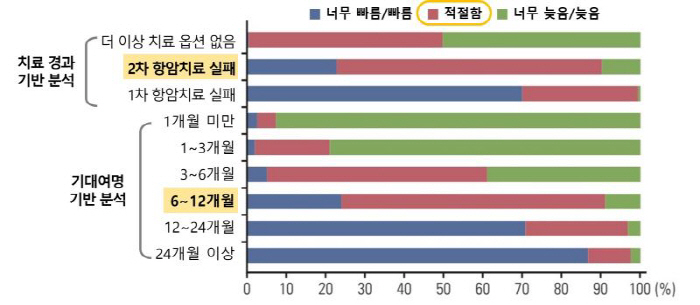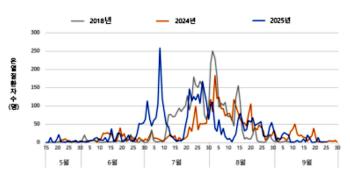74% of hematologic oncology specialists need early palliative care for cancer patients
Oct 16, 2025
|
For advanced cancer patients and their families, the physical and psychological pain increases as the disease progresses. In order to improve their quality of life, it is important to provide specialized palliative care services from the beginning of advanced cancer treatment. In fact, the American Society of Clinical Oncology (ASCO) recommends that cancer treatment and palliative care be provided in an integrated manner starting from 'initial diagnosis of advanced cancer or within 12 months of life expectancy'.
Specialty Palliative Care (SPC) refers to a medical service that provides comprehensive support by an early doctor to the palliative care team in order to alleviate the pain experienced by patients during cancer treatment.
Professor Yoo Shin-hye's team at the Center for palliative care and clinical ethics at Seoul National University Hospital and the Korean Cancer Relief and Support Medical Research Association under the Korean Association of Oncology announced the results of a survey of 227 domestic hematologic oncologists on the 16th on the perception and referral of specialized palliative care for advanced cancer patients.
As a result, 74.9% of respondents agreed to the early integration of cancer treatment and specialized palliative care. In addition, most respondents recognized that this would allow patients to receive a variety of help, including establishing a pre-care plan, linking hospice, end-of-life care, psychological and emotional support, and controlling symptoms.
However, contrary to the high empathy for early integration, actual palliative care referrals were mainly made at the end of the worsening prognosis. 70% of the respondents answered that they request palliative care just before cancer progression, treatment discontinuation, and pregnancy. The biggest obstacle to early integration was recognized as ▲ rejection of patients and their families (70.0%), ▲ concern about what would seem like abandonment of treatment (46.3%) ▲ lack of professional manpower (34.4%).
In addition, recognition of the timing of referral for palliative care was also later than the international recommendation criteria (initial diagnosis of advanced cancer or within 12 months of life expectancy). When analyzing the treatment course, 'secondary chemotherapy failure' was selected as the most appropriate time of referral. However, 70% of the respondents evaluated that the timing of 'first-line chemotherapy failure' is early, showing that palliative care is still recognized as a part of end-stage treatment. In the analysis of life expectancy, '6-12 months' was considered the most appropriate time to request, but more than half of the respondents evaluated that '3-6 months' was also appropriate.
On the other hand, the tasks necessary to revitalize early palliative care were answered in the order of ▲ improvement of patient and family awareness (40.5%), ▲ expansion of professional manpower (22.9%), ▲ establishment of a fee system (20.3%), emphasizing the need to improve social awareness and establish an institutional foundation.
Professor Ko Soo-jin (corresponding author, hematologic oncology department at Ulsan National University Hospital) said "Early integration of disease treatment and palliative care will enable patients to understand the disease on their own and reduce unnecessary over-treatment at the time of death."
Professor Yoo Shin-hye (first author, Center for palliative care and clinical ethics at Seoul National University Hospital) said, "Palliative care is not a abandonment of treatment, but a medical approach that reduces the pain of patients and their families and supports a better life. As many hematologic oncologists agree on early integration, education, infrastructure, and institutional improvements should be made to establish it in the actual medical field."
On the other hand, this study was carried out with the support of the patient-centered medical technology optimization research project of the Ministry of Health and Welfare, and was published in the latest issue of the Korean Cancer Society's international academic journal 'Cancer Research and Treatment'.
|
This article was translated by Naver AI translator.















